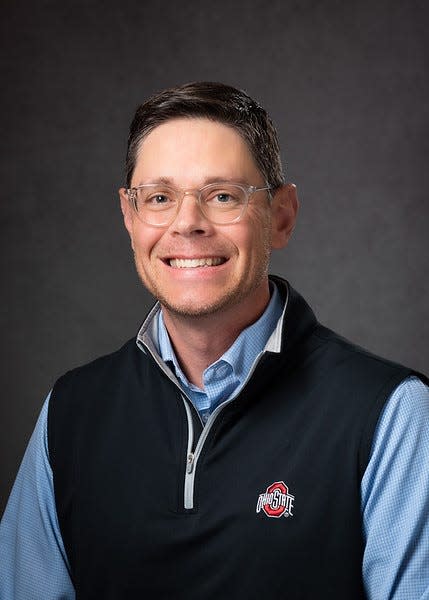Like touching boiling water. April 8 solar eclipse can leave you blind or without color
Editor's note: The information below was taken from a longer column written by Dr. David Rogers, Dr. Julia Stokes, Dr. Ryan Squier and Dr. Aaron Zimmerman and submitted by the Central Ohio Hospital Council. Find that column here.
Not using the proper eclipse glasses April 8 may lead to consequences that last beyond this nation's next solar eclipse Aug. 23, 2044.
Several Columbus area adults and children suffered permanent vision damage after looking at the sun without protection during the partial solar eclipse here in 2017.
Without proper protection, you could lose color perception, and experience blind spots and a big drop in your visual acuity for the rest of your life.

Even a few quick glances at the sun now-and-then will also cause damage. Since the full duration of the eclipse will be at least three hours in Ohio, three-or-four second glances taken every few minutes will quickly add up to more than enough exposure to damage your vision.
Spectacular and dangerous. How to safely enjoy 2024 solar eclipse.
Bottom line: this is a rare and exciting event that can be easily enjoyed. Just wear ISO-certified glasses when looking at the sun.
Keep an eye on children during the eclipse
One of the unique features of this eclipse is that it takes place between 2 p.m. and 4:30 p.m. in Ohio, when schools typically dismiss and many children are outside and less supervised than usual.
Their natural curiosity will make them want to look at the sun, and it’s every adult’s responsibility to try to prevent this from happening if they don’t have the necessary glasses.
Are you worried about the solar eclipse? April 8 event won't bring human sacrifice, but there are reasons for concern.
Fortunately, many Ohio schools in the path of the eclipse are closing early or planning distance learning on April 8. A list can be found on Dispatch.com.
Solar eclipse 2024: What central Ohio schools are canceling classes
Young children, especially, should be supervised.
If a child understands the danger of boiling water on a stove and knows not to reach for it, the child also should be able to understand the dangers of injuring their eyes by looking at the sun. Nevertheless, be sure to discuss these dangers with children and equip them with certified glasses if they’ll be outside during the eclipse. Because the eclipse unfolds over a three-hour period, children won’t be spending every minute looking at the sun.
The ISO-certified glasses are too dark to play in or to wear when walking or participating in other activities, but whenever they look at the sun, they must use the glasses.
The eclipse can be wonderful and enjoyable for children, and you should encourage them to see it, but only if they wear their glasses every time they look at the sun.
Where to find more information
Ohio Emergency Management: ema.ohio.gov. Ohio’s main information and reference website for the 2024 eclipse. Learn about the path of the eclipse through Ohio, get safety and planning advice, as well as links to other organizations involved in eclipse activities, parking dos and don’ts, and more.
American Astronomical Society: Find numerous features here, including a list of approved vendors for eclipse glasses on the Eye Safety page. Remember, these glasses are absolutely necessary if you look directly at the sun. Get yours free at a local library or order them from a reputable vendor now! Don’t delay. See eclipse.aas.org/eclipse-america-2024
NASA Plus Live Telecast: If it’s cloudy where you are, or you can’t get outside, watch the eclipse online thanks to NASA satellites and land centers. Watch at plus.nasa.gov starting at 1 p.m.



![ER physician Ryan Squier, who started the Ohio ACEP Opiate Awareness Team aimed at ending opiate abuse through education, poses for a portrait on Wednesday, July 11, 2018, in the Grant Hospital emergency department. [Fred Squillante/Dispatch]](https://s.yimg.com/ny/api/res/1.2/K1NLddkUO5p1XSipwh03jg--/YXBwaWQ9aGlnaGxhbmRlcjt3PTY0MDtoPTg0MA--/https://media.zenfs.com/en/aol_gannett_aggregated_707/20da6903dea12374768d32b68e41a45d)
Dr. David Rogers is chief of Nationwide Children’s Hospital's Department of Pediatric Ophthalmology. Dr. Julia Stokes is a Mount Carmel Medical Group Grove City Family Health family practice physician. Dr. Ryan Squier is associate medical director at the OhioHealth New Albany Emergency Department. Dr. Aaron Zimmerman is a clinical professor at the Ohio State University College of Optometry.
This article originally appeared on The Columbus Dispatch: Solar eclipse 2024: Why staring at sun may be like touch boiling water
